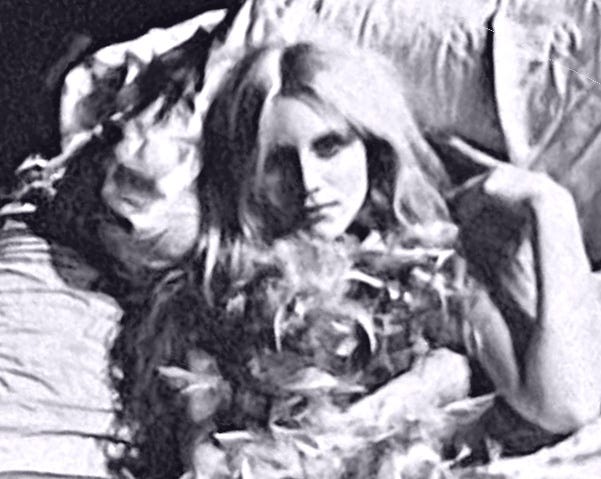The first time I laid eyes on her, Patti was literally radiant. I’d come to the Dorothy Parker Pavilion in Los Angeles with a member of my band to see Neil Young’s first high-class gig. There was an actual aura around Patti. A few months later, she and my best friend, my older brother of a different mother, found themselves working together for the old school publicist who, at Elton John’s famous Los Angeles debut at the Troubadour seven months before, had charged over to every writer in sight in his preposterous oversized cowboy hat to shout, “In-fucking-credible!”
When I found out he and the Angel of the Dorothy Parker Pavilion were colleagues, I invented a reason to visit OBDM at Cowboyhat PR’s office. Patti was wearing purple hot pants about 48 hours into the hot pants craze — and about a week before heterosexual males could even think about regaining their power of speech. I forgot who I was, and why I was there. I was glimpsing the divine.
A month later she was my girlfriend, which was to say that I, the boy who’d been picked second to last for every impromptu team in elementary school, the paralyzingly shy dweeb who hadn’t managed to ask a girl out until three months before his 18th birthday, the self-loathing runt, had as gorgeous a girlfriend as Warren Beatty, Roman Polanski, or any of the Beatles or Rolling Stones, as gorgeous as any film or rock star’s or rich fucker’s. I hadn’t won the lottery. I’d won a dozen lotteries on the same day.
I’d been validated.
I always felt simultaneously in those days of wealth and fame that I was in constant danger of being exposed as an imposter, and that I deserved everything I was getting, as recompense, if certainly not on merit. Hadn’t life bruised me mercilessly? Hadn’t I, about half the nights of my childhood, gone to bed wondering how I’d be able to endure the following day’s alienation, humiliation, and self-loathing?
We were 24 when we moved together to Laurel Canyon. Her emotional age was around 42, mine around 12. I clearly recognized and cherished her remarkable beauty, but wouldn’t realise until decades later that she was as beautiful inside as out — kind, generous, loyal, and tirelessly supportive.
And I? Well, I was Asshole of the Year, three years running. Domineering. Dismissive. Demanding. Petulant. Selfish. Maybe it was that Groucho Marx thing. Knowing deep down that I was an imposter, how could I respect anyone who loved me, any more than Groucho could aspire to membership in a golf club that would have him?
I wrote a song about her when, without my realizing, we had only a few months left. It’s chorus was My adoration grows every day. You’re what I look best about myself. Which is to say, I realize now, that I loved her less than I loved how her being my life partner validated me in the world’s eyes. Someone with that gorgeous a girlfriend has to have something going for him.
I marvel at how little I troubled myself to find out about her. I know almost nothing of what a screenwriter would call her back story. I do know, from photos, that she had never not been gorgeous. How had one who looked as she did arrive in adulthood so humble and down-to-earth? I had seen in my own childhood how the beauty of my schools’ most-desired girls had effectively forced them to learn standoffishness. It wasn’t only the aggressive me-Tarzan alpha boys from whom they needed protection, but, maybe even more, those who hated them for their own shyness. How dare she intimidate me so? (The wellspring of misogyny is the fear of rejection. You read it here first.)
Miraculously, thanks to her being an angel, we lasted 40 months, an eternity in one’s mid-twenties. It was obvious she would never dream of leaving me.
Until 50 years ago today, when she came home from work on a hot Friday afternoon and told me she loved me, but wasn’t in love with me anymore. I’m not sure how I lived through that. The only moment in my life to rival the pain of it was my 16-year-old daughter, who’d comfort-eaten herself into obesity at the moment in life one most wants to be thought gorgeous, telling me, “We’re not close, Daddy,” in response to my imploring her to let me try to help her.
For years, as my emotional age occasionally soared to around 15, the main thing I felt when I thought about Patti was how badly she’d hurt me. For the past 20 years or so, though, I think almost exclusively of what a bastard I was to her. Literally three or four times a day I think of her, and want to punch myself in the face. The pride I take in at least owning my sins is a single teardrop in the lake of shame I feel for having committed them.
“Autumn Approaching” was maybe the seventh song for which I both wrote the lyrics and composed the music. It’s about her, and about us. I wrote it in the spring following our midsummer dissolution, when I was finally beginning to regain the ability to go 10 minutes at a time without needing to self-anesthetize.
I’m not sure she ever heard it. It’s been 14 years since I was in touch with her. She may not even be alive. I hope she is, and that the fishing boat captain I understood her to have married in her 50s has treated her every day of their marriage as lovingly and tenderly as I wish to God I had.






Confession and repentance. This could be a modern sermon, it carries that much of a life lesson.